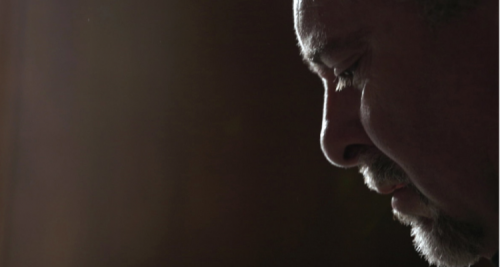A Sad Song, by Reed Lackey
18 Apr
Rarely have I rooted for a film to be effective as much as I did for Jacob Kindberg’s Sing Over Me, an intimate portrait of Christian singer/songwriter Dennis Jernigen and his lifelong struggle with homosexuality. Aware of the controversy of the subject, I was excited for a film that would address the issue from within the heart of the struggle, hopefully providing unflinching honesty, unique insight, and brave message of hope.
What I found in watching Sing Over Me was honesty that flinched a tad too often, insight that most would already have encountered, and a message of hope which feels a bit sadder than it probably should. In short, I walked away from the film feeling genuinely moved by its ambition and its message, yet unimpressed by its execution.
The film is certainly honest, particularly when dealing with the history of Jernigen’s personal struggles and with the rejection he felt among his church friends and family as a boy and young man. However, when it comes to the areas of transition—those moments when Jernigen emerged from his old desires into his new life with a wife and nine children—the film takes a startling tone of ambiguity, often covering years of personal transition with two or three phrases you’ve probably heard Christians use before. It begins to feel as if the film is more concerned with letting you know what Dennis has been through than with letting you know what he has learned through it.
A prime example is when the film tenderly chooses to examine Jernigen’s wedding night with his wife, which is handled with great taste and modesty. Yet, it spends barely any time at all on the question of maintaining an intimate relationship with the opposite sex over two decades after living with same-sex attraction. The film also never really touches on the perspective of Dennis’s children or the challenges of teaching them how to establish a personal identity after struggling to find his own. Even if the primary goal was simply to chronicle Dennis’s story without being burdened by providing solutions, I couldn’t help but feel that there were missed opportunities of interest along the way.
There is, however, a healthy dose of music. Often, this is very moving and I was surprised more than once at hearing a song I was very familiar with that I never knew Dennis had written. The songs are supposed to provide a thematic anchor, both to the life and vocation of Dennis himself and as a metaphor for his journey to find himself renewed in his relationship with Jesus Christ. For the most part, these musical refrains are very effective, but after the first hour, even they begin to feel somewhat repetitive.
The film also presumes a common knowledge base too often to make its point to a broader audience. In a montage covering Dennis’s successful worship ministry, we see photos of him with celebrities which perhaps only those with long-standing religious familiarity would recognize. We also hear phrases from the Bible used as descriptors such as “double-minded” with little context for non-Bible readers as to the phrase’s significance. These criticisms won’t be a problem for a well-churched audience, but could prove confusing for everyone else.
In the end, the message of hope is delivered primarily through tears. This vulnerability on Dennis’s part is admirable, but places a more tragic tone on the story than a hopeful one. The background is littered throughout with images of neglected and unkempt rooms, sparse church sanctuaries and remote fields of dying grass. These images communicated sorrow and grief to me and perhaps that was the intention, but by the time our story tries to rise above these images, that motif of sorrow is too well established. Even the film’s arguably most powerful moment (involving a tombstone Dennis had built to his former self) left me feeling more sympathetic for what Dennis had been through than inspired by hope for others with similar struggles.
I admire the mission of Dennis Jernigen and his willingness to be so vulnerable so publicly. I also admire the mission of Jacob Kindberg to tell Dennis’s story for as many as would be willing to hear it. It took profound courage for this film to be made and despite my criticisms, I’m very glad it was. But one of the hardest things about rooting for a team is watching them fumble the ball.




No comments yet